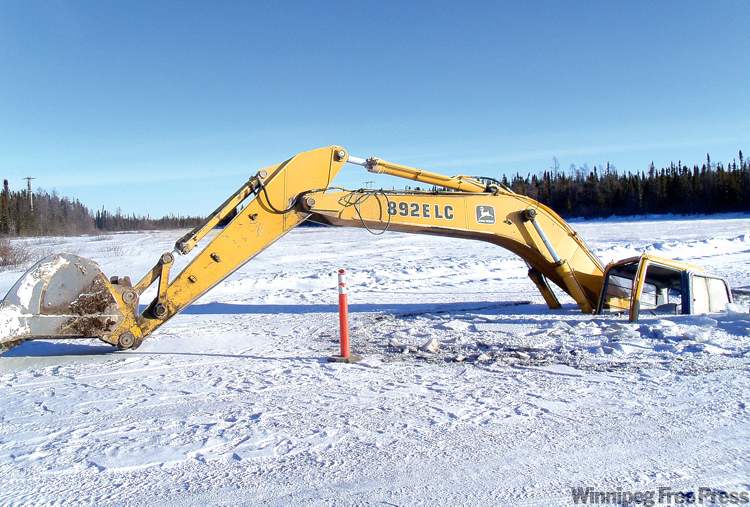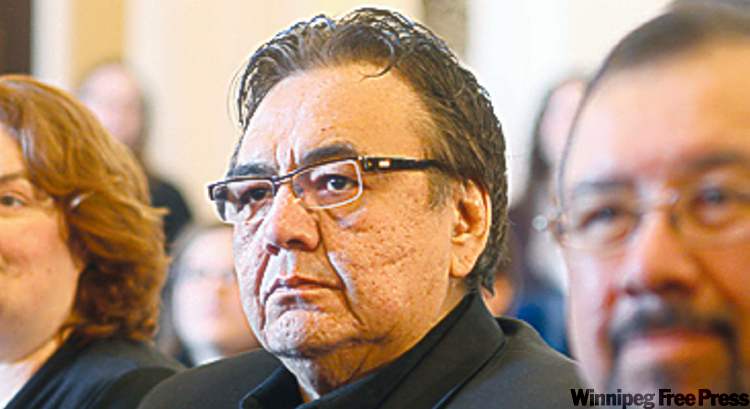Province ponders military aid
Winter-road delay critical; one community is out of fuel
Advertisement
Read this article for free:
or
Already have an account? Log in here »
To continue reading, please subscribe:
Monthly Digital Subscription
$0 for the first 4 weeks*
- Enjoy unlimited reading on winnipegfreepress.com
- Read the E-Edition, our digital replica newspaper
- Access News Break, our award-winning app
- Play interactive puzzles
*No charge for 4 weeks then price increases to the regular rate of $19.00 plus GST every four weeks. Offer available to new and qualified returning subscribers only. Cancel any time.
Monthly Digital Subscription
$4.75/week*
- Enjoy unlimited reading on winnipegfreepress.com
- Read the E-Edition, our digital replica newspaper
- Access News Break, our award-winning app
- Play interactive puzzles
*Billed as $19 plus GST every four weeks. Cancel any time.
To continue reading, please subscribe:
Add Free Press access to your Brandon Sun subscription for only an additional
$1 for the first 4 weeks*
*Your next subscription payment will increase by $1.00 and you will be charged $16.99 plus GST for four weeks. After four weeks, your payment will increase to $23.99 plus GST every four weeks.
Read unlimited articles for free today:
or
Already have an account? Log in here »
Hey there, time traveller!
This article was published 14/01/2012 (5074 days ago), so information in it may no longer be current.
OTTAWA — Manitoba Aboriginal Affairs Minister Eric Robinson says the province is considering asking the military for help getting fuel and other critical supplies to remote First Nations this winter.
Earlier this week northern chiefs declared a state of emergency, hoping to spur the provincial and federal governments to create a contingency plan for the fact the winter road network is delayed by several weeks.
Robinson said Friday he is preparing to do just that. “I’m prepared to contact the Canadian military to help out,” he said. “There are some communities with airstrips which can accommodate bigger aircraft.”

Manitoba Keewatinowi Okimakanak Grand Chief David Harper was thrilled to hear the idea.
“That would be awesome,” he said. “That would be exactly the kind of response we are looking for.”
Usually at least some of the 2,200 kilometres of winter roads are open by now, but unseasonably warm weather means no roads are yet functional. A spokesman for Manitoba Infrastructure estimated earlier this month it will be the end of January before the first roads open.
The latest predictions from Manitoba Infrastructure have the first roads in the extreme northern parts of the province open late next week, and all the roads open by the second week of February. But that is only if Mother Nature co-operates. How long they stay open also depends on the weather. Most years, the roads are closed sometime in March.
Already one community — Berens River — has run out of fuel and a second, Manto Sipi, is getting close to running out.
There are also concerns there won’t be enough time to ship in $5.5 million in promised supplies from Ottawa to start retrofitting homes in the Island Lake region to have clean, running water. If the supplies don’t get there on the winter roads, it will put off by another year the promise to bring running water to more than 1,000 residents who rely on slop pails and water buckets.
In 2010, the roads were open for just a few weeks in some areas, leaving the communities far short of getting in all the shipments they needed. The following winter, it led to fuel shortages and price hikes on groceries and gas until the roads opened once again. Ottawa spent $2.4 million in extra shipping costs to fly in critical materials.
The provincial and federal governments cost-share the price of building the winter roads. Since 2006, they’ve spent an average of $13 million to build and maintain the roads for six to eight weeks of the year.
Robinson said there are some communities already running out of fuel because the roads are delayed.

“It’s getting to a point where it’s desperate,” he said. “We’re holding out hope there will be a winter road system.”
A spokesperson for the federal government would not say whether the military is an option if communities need extra help this year because of winter road delays.
“(Aboriginal Affairs and Northern Development) officials have been and continue to be in contact with winter road communities on a regular basis and will assist if there are shortages of essential supplies,” Ellen Funk said in an emailed statement. “If needed, AANDC will coordinate emergency assistance, as was done in early 2010 when the winter-road season was shorter than normal. Our priority is the health and safety of local First Nations and that is why we continue to work with the Province and partners.”
Nearly 30,000 people living in 20 communities rely on winter roads as their once-a-year land connection to ship in critical supplies. Everything from heating fuel to food staples, construction supplies and more. Normally 2,500 shipments come in by truck on the roads during a season that stretches about six to eight weeks.
This year there might be just a few weeks total for shipments.
mia.rabson@freepress.mb.ca
Key numbers:
30,000 people from 20 communities rely on winter roads
2,500 shipments arrive by truck each winter-road season
Roads are typically open for six to eight weeks
There are approximately 2,200 kilometres of winter roads in the province

